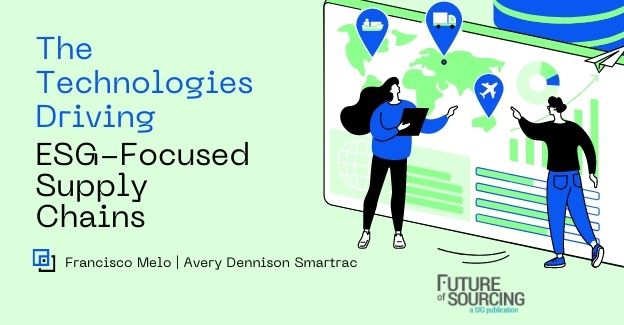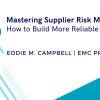Over the past year I’ve had the chance to speak to a variety of senior business and sustainability leaders about supply chain topics and their implications on a range of ESG issues. What is apparent from these conversations is that the supply chain is increasingly considered to be one of the most impactful components of a company’s sustainability efforts.
This trend is also echoed by the findings revealed at the UN Global Compact Leaders’ Summit, which showed that 50% of companies globally say that supply chain sustainability has grown in importance since the start of the COVID-19 pandemic.
Perhaps not surprising when we consider increased public attention following high profile incidents, from poor labor conditions at multiple large manufacturing facilities to a Greenpeace petition to end unsold goods being destroyed. Consumer, investor and shareholder pressure is mounting, and so too is regulatory pressure.
The UK’s Competition and Markets Authority has just launched the Green Claims Code to help businesses understand how to communicate their green credentials while reducing the risk of misleading shoppers. In Germany, a new legislation on corporate due diligence in supply chains requires large businesses to prevent human rights and environmental abuses within their global supply chains, with fines of up to 2% of annual turnover for breaching the rules.
Decarbonizing the Supply Chain
The focus on supply chain issues will only intensify, and the expectation from leaders to familiarize themselves with how their companies are managing their supply chains across first-tier and lower-tier suppliers is not going away.
To help navigate this new business paradigm, here are five key strategies to consider:
Focus on Transparency – Modern-day supply chains are a complex web, which means there are often many knowledge gaps in information flow. For many companies, the pandemic revealed a worrisome lack of full visibility into their supply chains and exposed poor practices. It’s important to identify your operational weaknesses among first-, second- and third-tier suppliers to ensure proper oversight and management of supply chains.
Digitize at Speed and Scale – Now is the time for bold moves and the adoption of emerging digital technologies to digitize supply chains at scale. RFID (radio frequency identification) technology can bring inventory accuracy up to 99%, increasing the speed of everyday processes and reducing problems with inventory, stock shortages and waste. In the apparel industry alone, RFID has proven to reduce apparel inventories by 2% to 13% while at the same time providing a sales lift of 1.5% to 5.5%.
Invest for Business Value – To unlock the power of digital transformation it must be embedded in a company’s digital strategy with clear financial and operational-performance metrics in place. Alignment with real business needs and your sustainability strategy will ensure adoption across your organization.
Technological investment will be crucial to building ESG-focused supply chains. In one survey, 77% of business leaders listed environmental sensors and the Internet of Things as important to meeting their sustainability goals, and in another, more than one-fifth said they had accelerated their digitalization plans by three years (source: Cognizant).
Omnichannel Oversight – Avery Dennison’s Regenerative Retail Economy report examines the shopping habits that grew during lockdown such as Buy Online Pick-up In-Store (BOPIS) and curbside delivery, as well as the predicted growth of e-commerce over the next few years. To adapt to these trends, businesses will need to implement a hybrid, omnichannel experience and look to digital solutions to give them greater oversight of their stock and improve efficiency and access to information. Being able to RFID-tag items and get data about exactly what you have in stock and where allows a lot more flexibility and knowledge about your supply chain, which in turn eliminates overstocking and overproduction.
One brand getting very creative with RFID technology is Etam, the number one lingerie brand in France. With 1,200 new lines every season the brand uses RFID to move fast, with a specific “Order Management System'' providing a global vision of stock, whatever the location. This includes RFID and QR coded hangtags to digitize the whole value chain and processes, along with vendor shipments, store inventory accuracy, self-check-outs, returns or reverse logistics, e-commerce and the retailer’s Try@home initiative.
Understand Supply Chain Decarbonization – To meet the urgency of curbing climate change, it is critical that businesses act to eliminate greenhouse gas (GHG) emissions. Supply chains represent a great opportunity to decarbonize and meet net-zero pledges and the technology that is needed to significantly reduce emissions is readily available.
Avery Dennison’s atma.io enables brands across apparel, beauty, food and healthcare to give every product a digital ID which is connected to the cloud. This means it can be traced along the supply chain and enables businesses to determine the carbon cost of each product, from manufacturer to store shelf. For example, one major sports retailer is piloting atma.io to trace the carbon footprint of its raw materials. When we consider industries such as logistics and transport, or food supply chains which account for 26% of all GHG emissions, the possibilities are huge and the supply chain’s role in decarbonization could be an absolute game-changer.
Forward-thinking leaders know that it’s no longer enough to dip their toes in the waters of digitization, what’s needed is a systemic transformation of supply chains if we want business and the planet to thrive. I am both confident and hopeful that we will see increased momentum in the coming months as regulatory, commercial and consumer pressure mounts.









